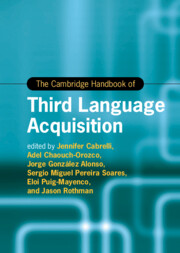Book contents
- The Cambridge Handbook of Third Language Acquisition
- Cambridge Handbooks in Language and Linguistics
- The Cambridge Handbook of Third Language Acquisition
- Copyright page
- Contents
- Figures
- Tables
- Contributors
- Introduction Multilingualism
- Part I Theoretical Approaches to L3/Ln
- 1 Generative Approaches to Third Language Acquisition
- 2 The Usage-Based Approach
- 3 Third Language Acquisition from a Complexity Dynamic Systems Theory Approach
- 4 A Critical Sociolinguistics Perspective on L3 Acquisition
- Part II L3/Ln across Linguistic Domains
- Part III Becoming and Staying Multilingual at Different Ages
- Part IV L3/Ln in Action
- Part V L3/Ln and Cognition
- Part VI Research Methods in L3/Ln
- Index
- References
4 - A Critical Sociolinguistics Perspective on L3 Acquisition
from Part I - Theoretical Approaches to L3/Ln
Published online by Cambridge University Press: 13 July 2023
- The Cambridge Handbook of Third Language Acquisition
- Cambridge Handbooks in Language and Linguistics
- The Cambridge Handbook of Third Language Acquisition
- Copyright page
- Contents
- Figures
- Tables
- Contributors
- Introduction Multilingualism
- Part I Theoretical Approaches to L3/Ln
- 1 Generative Approaches to Third Language Acquisition
- 2 The Usage-Based Approach
- 3 Third Language Acquisition from a Complexity Dynamic Systems Theory Approach
- 4 A Critical Sociolinguistics Perspective on L3 Acquisition
- Part II L3/Ln across Linguistic Domains
- Part III Becoming and Staying Multilingual at Different Ages
- Part IV L3/Ln in Action
- Part V L3/Ln and Cognition
- Part VI Research Methods in L3/Ln
- Index
- References
Summary
This chapter on a critical sociolinguistics offers a revealing angle on the acquisition of a third language by providing qualitative information about the context in which acquisition takes place. It is an approach that places at the center of inquiry, concerns of power, inequality, and social inclusion. The goal is to promote reflection on certain assumptions and methodologies associated with mainstream L3 acquisition research and, also, to present data and cases from qualitative ethnographic studies that seek to challenge current thinking. Despite ontological differences regarding the sorts of questions and frameworks to account for knowledge in the field of third language acquisition, many researchers recognize the need to go beyond the boundaries of processing and cognitive predictions and their related methodologies to provide a more holistic, dynamic, and comprehensive understanding. This recognition of the social – even if it is defined as a limited to a set of variables (i.e., age, gender, class) or assigned to a cognitive subsystem – allows L3 researchers to account for the wide variation in individual developmental differences in the process of acquiring a third or additional language.
- Type
- Chapter
- Information
- The Cambridge Handbook of Third Language Acquisition , pp. 96 - 112Publisher: Cambridge University PressPrint publication year: 2023

